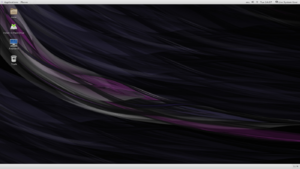Software:Scientific Linux
 | |
 Scientific Linux 7.0 with GNOME | |
| Developer | Fermi National Accelerator Laboratory (Fermilab) / European Organization for Nuclear Research (CERN) |
|---|---|
| OS family | Linux (Unix-like) |
| Working state | Discontinued Supported until RHEL 7 EOL |
| Source model | Open source |
| Initial release | May 10, 2004 |
| Marketing target | Scientific purpose / High Performance Computing / Servers / Desktops[1] |
| Update method | Yum (PackageKit) |
| Package manager | RPM Package Manager |
| Platforms | x86, x86-64 |
| Kernel type | Monolithic (Linux) |
| Default user interface | GNOME |
| License | GNU GPL & Various others. |
| Official website | www |
Scientific Linux (SL) is a discontinued Linux distribution produced by Fermilab, CERN, DESY and by ETH Zurich. It is a free and open-source operating system based on Red Hat Enterprise Linux.[2]
This product is derived from the free and open-source software made available by Red Hat, but is not produced, maintained or supported by them.
In April 2019, it was announced that feature development for Scientific Linux would be discontinued, but that maintenance will continue to be provided for the 6.x and 7.x releases through the end of their life cycles. Fermilab and CERN will utilize CentOS Stream[3] and AlmaLinux[4] for their deployment of 8.x release instead.
History
Fermilab already had a Linux distribution known as Fermi Linux, a long-term support release based on Red Hat Enterprise Linux. CERN was creating their next version of CERN Linux, also based on RHEL. CERN contacted Fermilab about doing a collaborative release. Connie Sieh was the main developer and driver behind the first prototypes and initial release.[1] The first official release of Scientific Linux was version 3.0.1, released on May 10, 2004.
In 2015, CERN began migrating away from Scientific Linux to CentOS.[5][6]
Scientific Linux is now maintained by a cooperative of science labs and universities. Fermilab is its primary sponsor.[1]
Design philosophy
The primary purpose of Scientific Linux is to produce a common Linux distribution for various labs and universities around the world, thus reducing duplicated effort. The main goals are to have everything compatible with Red Hat Enterprise Linux with only minor additions and changes, and to allow easy customization for a site, without disturbing the Linux base.[7] Unlike other distributions such as Poseidon Linux, it does not contain a large collection of scientific software as its name may suggest.[2][8] However, it provides good compatibility to install such software.
Features
Scientific Linux is derived from Red Hat Enterprise Linux without protected components such as Red Hat trademarks, thus making it freely available.[9] New releases are typically produced about two months after each Red Hat release.[1] As well as a full distribution equal to two DVDs, Scientific Linux is also available in LiveCD and LiveDVD versions.[9]
Scientific Linux offers wireless and Bluetooth out of the box, and it comes with a comprehensive range of software, such as multimedia codecs, Samba, and Compiz,[8] as well as servers and clients, storage clients, networking, and system administration tools.[1]
It also contains a set of tools for making custom versions, thus allowing institutions and individuals to create their own variant.[1]
Release history
Historical releases of Scientific Linux are the following.[10][11] Each release is subjected to a period of public testing before it is considered 'released'.
| Scientific Linux release | Codename | Architectures | RHEL base | Scientific Linux release date | Red Hat Enterprise Linux release date | Delay |
|---|---|---|---|---|---|---|
| 3.0.1 | Lithium | i386, x86-64 | 3.1 | 2004-05-10 | 2004-01-16 | 106d |
| 4[1] | Beryllium | 4 | 2005-04-20 | 2005-02-14 | 65d | |
| 5[12][13] | Boron | 5 | 2007-05-14 | 2007-03-14 | 61d | |
| 6[14][15][16][17] | Carbon | 6 | 2011-03-03 | 2010-11-10 | 113d | |
| 7[18][19] | Nitrogen | x86-64 | 7 | 2014-10-13 | 2014-06-10 | 125d |
Support
Security updates are provided for as long as Red Hat continues to release updates and patches for their versions.[20]
| Scientific Linux release | Full updates | Maintenance updates |
|---|---|---|
| 3 | 2006-07-20 | 2010-10-31 |
| 4 | 2009-03-31 | 2012-02-29 |
| 5 | Q1 2014 | 2017-03-31 |
| 6 | Q2 2017 | 2020-11-30 |
| 7 | Q4 2019 | 2024-06-30 |
See also
- Fermi Linux, Fermilab's own custom version of Scientific Linux
- CentOS, another distribution based on Red Hat Enterprise Linux
- Rocks Cluster Distribution, a Linux distribution intended for high-performance computing clusters
References
- ↑ 1.0 1.1 1.2 1.3 1.4 1.5 1.6 Carla Schroder (March 23, 2012). "Scientific Linux, the Great Distro With the Wrong Name". https://www.linux.com/learn/scientific-linux-great-distro-wrong-name.
- ↑ 2.0 2.1 "General Questions about Scientific Linux (Community)". https://www.scientificlinux.org/documentation/faq/faq-community/.
- ↑ Cooper, Glenn (October 25, 2021). "Fermilab/CERN recommendation for Linux distribution". https://listserv.fnal.gov/scripts/wa.exe?A2=SCIENTIFIC-LINUX-USERS;4c8eeca4.2110.
- ↑ "Fermilab/CERN recommendation for Linux distribution". December 7, 2022. http://news.fnal.gov/2022/12/fermilab-cern-recommendation-for-linux-distribution.
- ↑ "Scientific Linux @ CERN: Next Version". CERN. https://linux.web.cern.ch/linux/slc-nextversion.shtml.
- ↑ "CC7: CERN CentOS 7". CERN. http://linux.web.cern.ch/linux/centos7/.
- ↑ "Welcome to Scientific Linux (SL)". https://www.scientificlinux.org/.
- ↑ 8.0 8.1 "Scientific Linux – It blinded me with science!". February 3, 2010. http://www.dedoimedo.com/computers/scientific-linux.html.
- ↑ 9.0 9.1 "Scientific Linux 5.6 Live released". July 11, 2011. http://www.h-online.com/open/news/item/Scientific-Linux-5-6-Live-released-1276856.html.
- ↑ "News Archives". https://www.scientificlinux.org/news/archive/.
- ↑ "S.L. Distribution Roadmap". https://www.scientificlinux.org/distributions/roadmap.
- ↑ Scientific Linux – It blinded me with science!, Dedoimedo
- ↑ DistroWatch Weekly, Issue 351, 26 April 2010
- ↑ Scientific Linux 6 – Another great distro, but, Dedoimedo
- ↑ DistroWatch Weekly, Issue 419, 22 August 2011
- ↑ Scientific Linux 6.1 Carbon review – Almost there, Dedoimedo
- ↑ Scientific Linux 6.5 Carbon – Fast and dubious, Dedoimedo
- ↑ Scientific Linux 7.1 review – More fiasco, Dedoimedo
- ↑ Download Scientific Linux 7.5, Softpedia Linux
- ↑ "End of life dates for SL versions". https://www.scientificlinux.org/distributions/roadmap.
External links
 |

